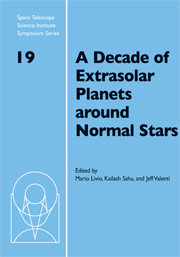 A Decade of Extrasolar Planets around Normal Stars
A Decade of Extrasolar Planets around Normal Stars Published online by Cambridge University Press: 22 October 2009
The host stars of extrasolar planets (ESPs) tend to be metal rich. We have examined other properties of these stars in search of systematic trends that might distinguish exoplanet hosts from the hoi polloi of the Galactic disk; we find no evidence for such trends among the present sample. The α-element abundance ratios show that several ESP hosts are likely to be members of the thick disk population, indicating that planet formation has occurred throughout the full lifetime of the Galactic disk. We briefly consider the radial metallicity gradient and age-metallicity relation of the Galactic disk, and complete a back-of-the-envelope estimate of the likely number of solar-type stars with planetary companions with 6 < R < 10 kpc.
To save this book to your Kindle, first ensure no-reply@cambridge.org is added to your Approved Personal Document E-mail List under your Personal Document Settings on the Manage Your Content and Devices page of your Amazon account. Then enter the ‘name’ part of your Kindle email address below. Find out more about saving to your Kindle.
Note you can select to save to either the @free.kindle.com or @kindle.com variations. ‘@free.kindle.com’ emails are free but can only be saved to your device when it is connected to wi-fi. ‘@kindle.com’ emails can be delivered even when you are not connected to wi-fi, but note that service fees apply.
Find out more about the Kindle Personal Document Service.
To save content items to your account, please confirm that you agree to abide by our usage policies. If this is the first time you use this feature, you will be asked to authorise Cambridge Core to connect with your account. Find out more about saving content to Dropbox.
To save content items to your account, please confirm that you agree to abide by our usage policies. If this is the first time you use this feature, you will be asked to authorise Cambridge Core to connect with your account. Find out more about saving content to Google Drive.